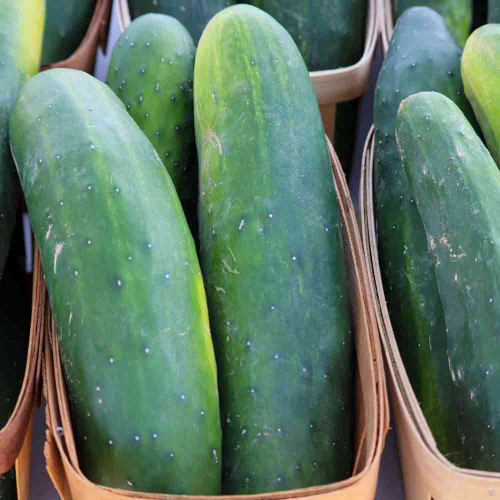Description
True Lemon Cucumber - Truly Sweet and Bitter-Free
An early 20th Century hoax made these cucumbers famous for American home gardeners. The huckster, commemorating his only daughter’s wedding in 1909, spun the tall tale that he had created a new cucumber by using the orange blossom from his daughter’s bridal bouquet to pollinate his favorite cucumber variety, resulting in a citrus-shaped, sunny-colored fruit.
The result was a cucumber bearing - in his words, “fruit like an orange, with flesh having the most delicious blending of the finest Florida orange with the crispness of a delectable cucumber.”
He offered seeds from this marvelous breeding for only $1 per seed, which is about $33.17 in 2023, and only one seed per person.
Remember, the early 20th Century was abundant with botanical wonders, as plant breeders like Luther Burbank accomplished incredible feats in horticulture daily.
As you might expect, it didn’t take long for fed-up horticulturist Hal B. Fullerton to expose the story as false. His article “Fakes and Facts” published in the March 1, 1910 edition of the Long Island Agronomist addresses the fact of the “orange cucumber” was the well-known lemon cucumber, readily available for 10 cents per packet at the time.
Intro
The first mention of Lemon cucumber is in the 1894 seed catalog of Samuel Wilson with this description: “They are considered a great dainty by those who are fond of that popular vegetable. They have all the desired qualities of a good cucumber, slightly flavored with lemon, which gives them a decided advantage over the common kind.”
The 1901 James Vick & Sons catalog Lemon cucumber seed for a dime per packet and described it - “The flesh is exceedingly tender and crisp, with a sweet flavor surpassing all other cucumbers. They have none of the bitter or acid taste so generally found in cucumbers”.
Home gardeners often described Lemon as having a better flavor than other cucumbers, being very sweet and noticeably free of bitterness. The reason for the sweetness is its remarkably high Brix - a measure of plant sap sugars - of 5.4%, the highest of any of the 245 cultivars tested in 1987.
Its bitter-free taste is due to a very low cucurbitacin content, a bitter-tasting biochemical compound produced by the cucurbit family, of which cucumbers are part. This makes Lemon cucumber less bitter and with fewer indigestion problems.
History
This cucumber is much more than an interestingly-colored cuke popularized by a hoax. While it’s not overtly lemony tasting, it has been cultivated for centuries, and some horticulturists hypothesize it is the oldest cucumber cultivar still being grown today.
In general, cucumbers are thought to have originated in India at the foot of the Himalayas and were cultivated in western Asia for 3,000 years. Well known by the ancient Greeks and Romans, introduced to China in the 2nd century BC. Columbus brought cucumbers to the New World in 1494.
Several of the Lemon cucumber’s unique characteristics have existed since antiquity. In 1966, the Iraq Ministry of Agriculture documented that a Sumerian cucumber grown in Iraq thousands of years ago had short ovoid fruit. In 1859 botanist Charles Victor Naudin wrote of a landrace cucumber from India with fruit resembling the Lemon, and master Renaissance painter Raphael Sanzio depicted lemon-shaped cucumbers in the Villa Farnesina frescoes in the 16th Century.
Uses
The perfect size for snacking, salads or sandwiches.
Growing Tip
Cucumbers need to be continuously harvested to keep up production. If the fruits yellow on the vine the plant will stop producing altogether, To harvest twist them off the vine or snip them with clippers to make sure you do not damage the vines.
Learn More
- Armenian Cucumber - Best Burpless Heirloom Cucumber
- Achocha - the Unknown Cucumber Relative
- Cilantro Freezer Pickles
From the soil to the seed to the food you eat - we'll help you grow your best garden!
1 Review
-
Personal- sized cucumbers
As the description says, they were free of bitterness and scrambled up my trellis to make for easy picking. Still produced after some other cucumbers were pooped out.





















